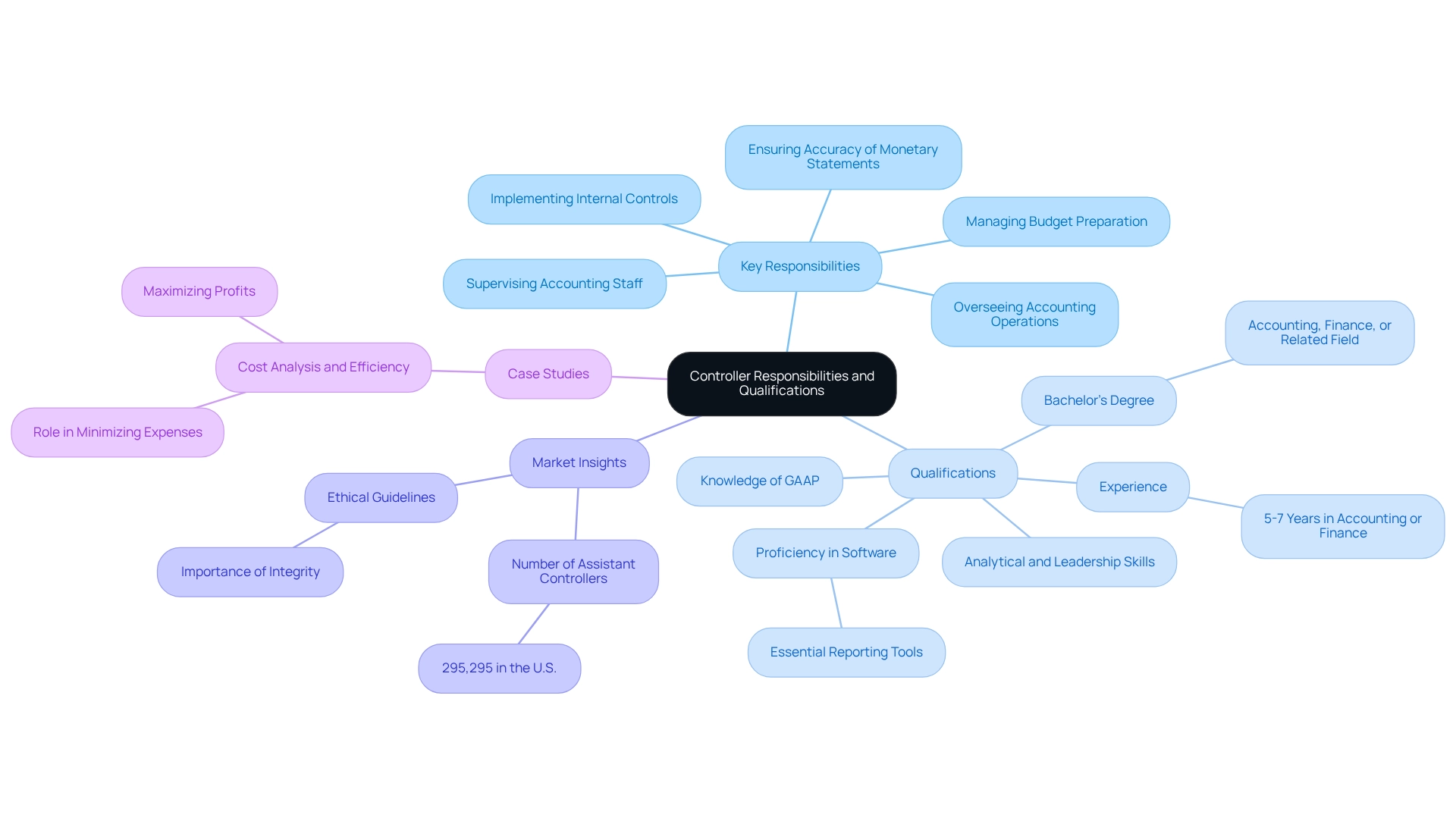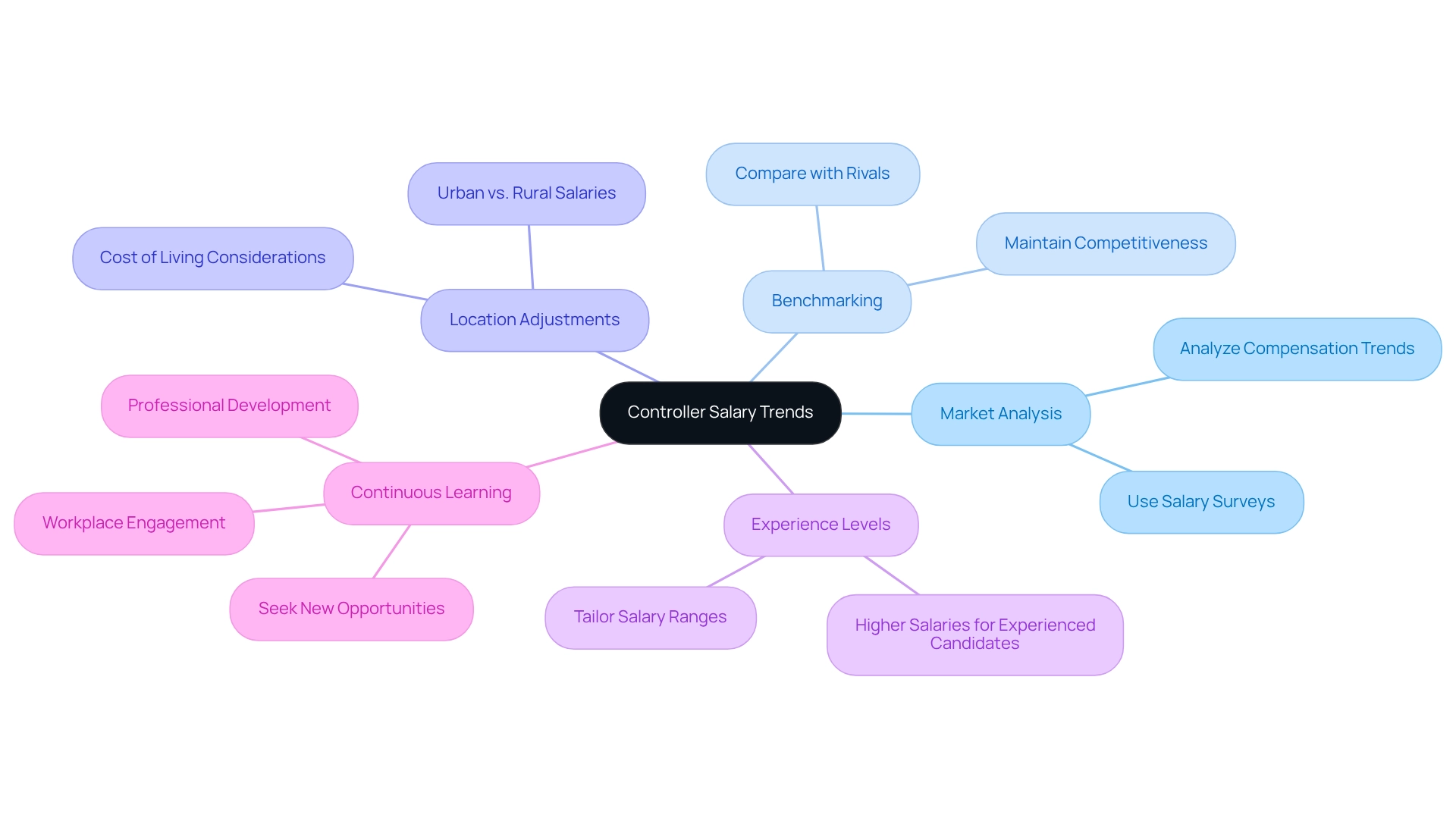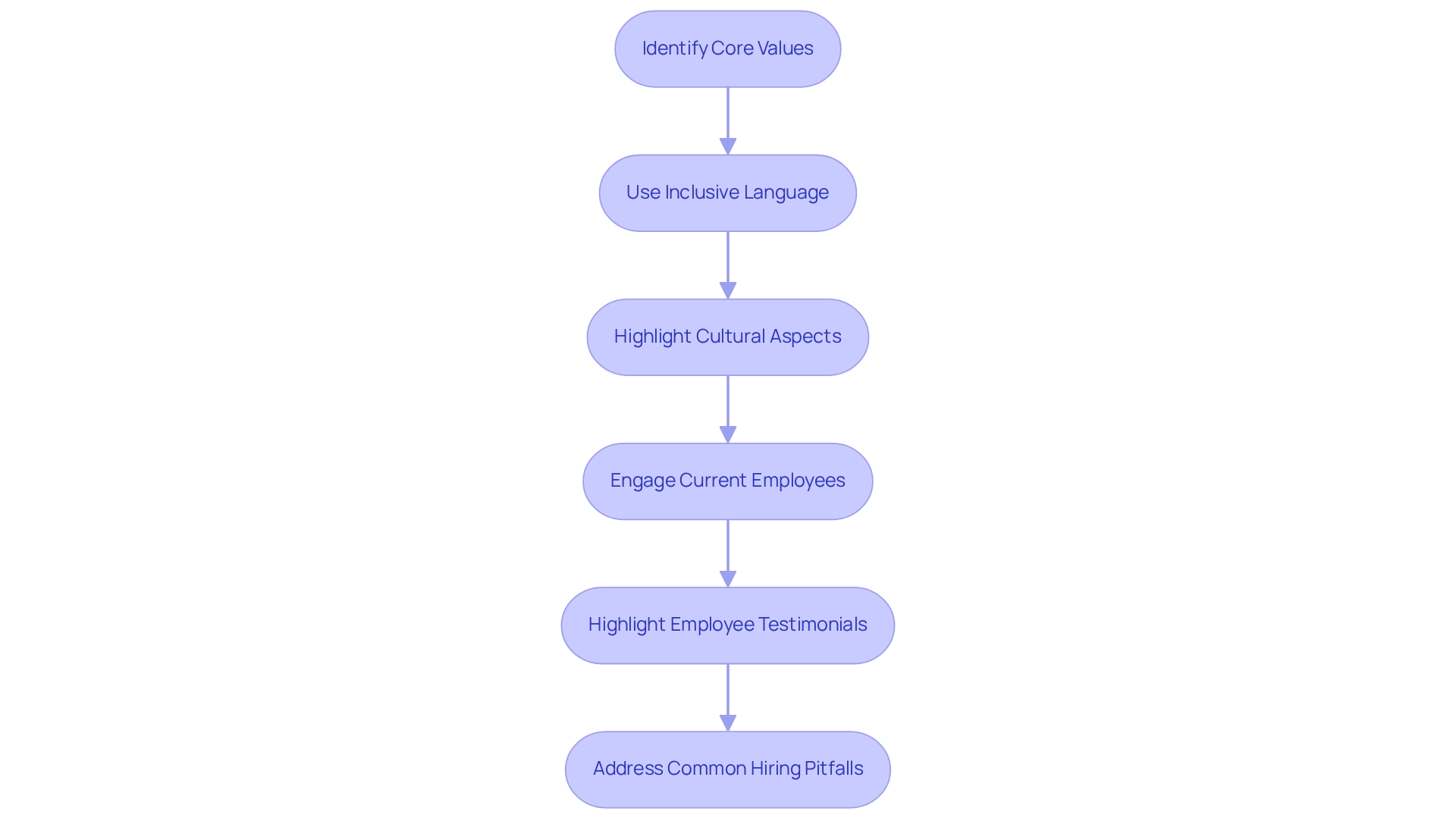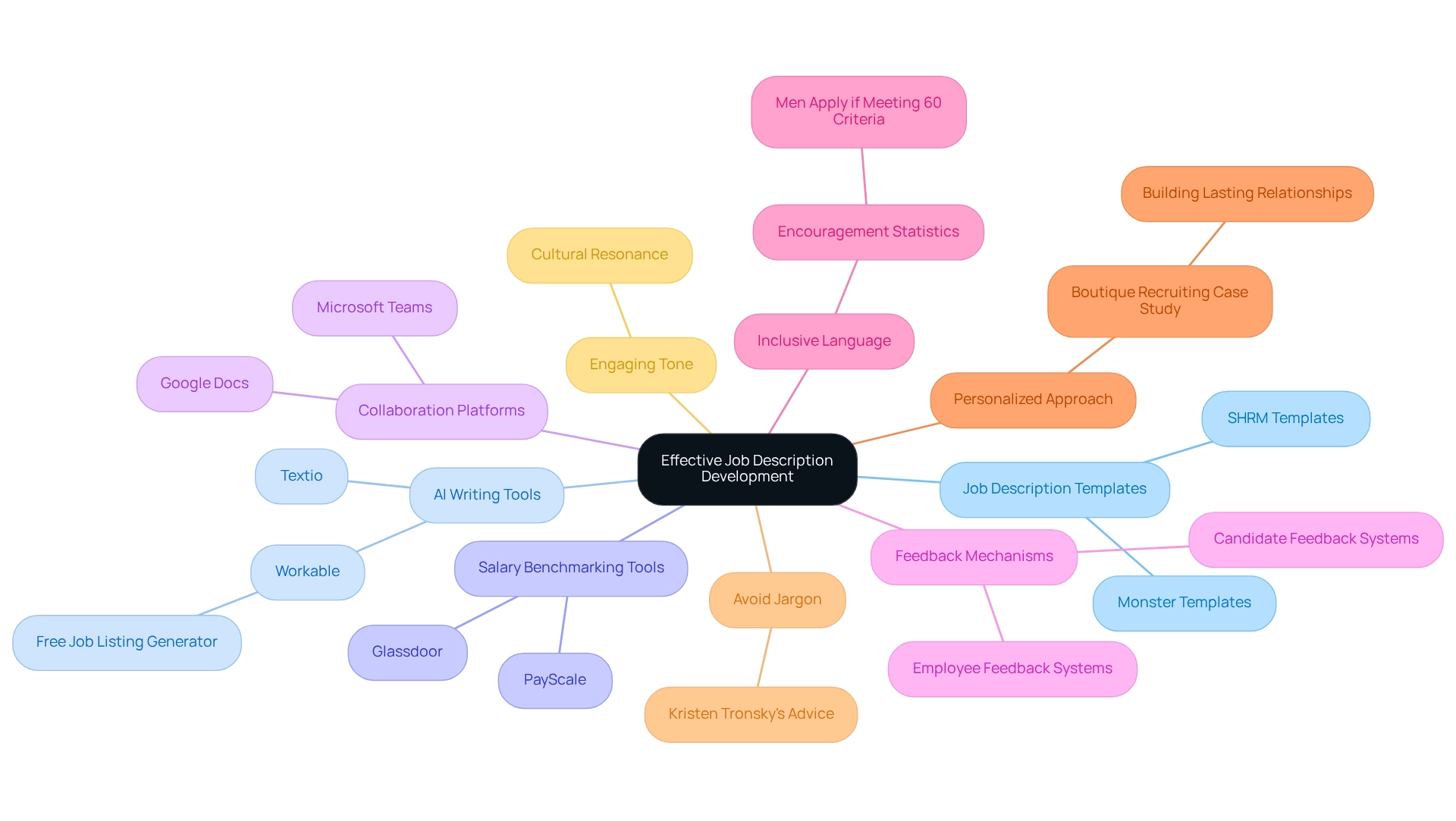Overview
This article delves into the creation of effective job descriptions and the understanding of salary insights for controller positions, underscoring the essential responsibilities, qualifications, and salary benchmarks necessary for attracting top talent. A well-defined job description, reflective of organizational culture and employing inclusive language, combined with competitive salary ranges—averaging approximately $249,527—are pivotal for engaging qualified candidates in today’s competitive market.
In the financial sector, recruitment challenges are significant, and addressing them requires a strategic approach. Understanding labor laws that impact hiring practices is crucial for both compliance and attracting the right candidates. By leveraging personalized recruitment services tailored to the financial industry, organizations can enhance their hiring outcomes.
Testimonials from satisfied clients serve as a testament to the effectiveness of these strategies. To navigate this competitive landscape successfully, reach out for a consultation and discover how to refine your recruitment process.
Key Highlights:
- Controllers oversee accounting operations, manage budgets, ensure accuracy of financial statements, implement internal controls, and supervise accounting staff.
- Qualifications for controllers include a bachelor’s degree in accounting or finance, 5-7 years of managerial experience, knowledge of GAAP, proficiency in relevant software, and strong analytical and leadership skills.
- As of April 2025, the average salary for controllers in the U.S. is approximately $249,527, with a range from $58,000 to $300,000, influenced by location, industry, and experience.
- Salary benchmarking involves analyzing salary surveys, comparing against industry rivals, adjusting for location, and considering experience levels.
- Effective job descriptions should reflect organizational culture, utilize inclusive language, highlight cultural aspects, and engage current employees for authenticity.
- Resources for creating job descriptions include templates, AI writing tools, salary benchmarking tools, collaboration platforms, and feedback mechanisms.
- Using clear and engaging language in job postings can attract a diverse pool of candidates and improve hiring outcomes.
Introduction
In the competitive landscape of financial management, the role of a controller is undeniably critical. As organizations strive for financial integrity and strategic growth, crafting precise job descriptions is essential for attracting the right talent. This article delves into the key responsibilities and qualifications required for controllers. It explores current salary trends and market benchmarks, while emphasizing the importance of aligning job descriptions with company culture. By leveraging effective resources and tools, companies can enhance their recruitment processes. This ensures they not only find skilled professionals but also foster a workplace that resonates with their values.
Define Key Responsibilities and Qualifications for Controllers
Crafting an effective controller job description and salary is crucial in today’s competitive financial landscape. The controller job description and salary outline the role’s demands for a clear definition of key responsibilities, which typically include:
- Overseeing all accounting operations
- Managing budget preparation
- Ensuring the accuracy of monetary statements
- Implementing internal controls
- Supervising accounting staff
As we look towards 2025, the qualifications required for this controller position have become increasingly rigorous, reflecting the evolving demands of the economic landscape. The controller job description and salary outline the requirements for candidates, including:
- A bachelor’s degree in accounting, finance, or a related field
- A minimum of 5-7 years of experience in accounting or finance, particularly in managerial roles
- Strong knowledge of Generally Accepted Accounting Principles (GAAP) and regulations
- Proficiency in software and reporting tools essential for efficient operations
- Excellent analytical and leadership skills to drive team performance and strategic initiatives
As the role of controllers is pivotal in shaping an organization’s future, case studies highlight their contributions to cost analysis and efficiency. Effective controllers recognize cost-efficient practices that significantly enhance the economic well-being and sustainability of their organizations. As the landscape of monetary management continues to evolve, the significance of these qualifications and responsibilities cannot be overstated.
Notably, there are approximately 295,295 assistant controllers working in the United States, indicating a competitive market concerning the controller job description and salary. Moreover, as Dicken, the Budget Manager of Good Men Investment Co. Ltd., pointed out, adherence to ethical guidelines is vital in this position, underscoring the importance of integrity in resource management. The pivotal role of financial controllers in shaping organizational futures cannot be underestimated. Additionally, roles such as CAO, Sr. Accountant, and Staff Accountant are integral to the accounting landscape.
Boutique Recruiting’s targeted recruitment services can assist in finding qualified candidates for these positions. Are you ready to elevate your organization’s financial leadership? Reach out for a consultation today.
Research Salary Trends and Market Benchmarks for Controller Roles
To establish competitive salary ranges for controller positions, it is essential to analyze current market trends through reliable sources such as Robert Half and Glassdoor, considering the controller job description and salary. As of April 2025, the controller job description and salary in the United States indicate that the average salary is approximately $249,527 per year, with typical ranges spanning from $58,000 to $300,000. Various factors influence these figures, including location, industry, and business size.
Consider the following steps to effectively determine salary benchmarks:
- Analyze Salary Surveys: Utilize salary surveys from reputable firms, including Salary.com, to collect data on compensation trends, ensuring your figures reflect the latest market insights.
- Benchmark Against Rivals: Compare your salary offerings with those of similar firms within your industry to maintain competitiveness and attract top talent.
- Adjust for Location: Recognize geographical disparities, as salaries can differ significantly between urban and rural areas. For instance, controllers in metropolitan regions often earn higher salaries due to increased living costs and demand for skilled professionals.
- Consider Experience Levels: Tailor salary ranges according to the experience level required for the position. More experienced candidates typically command higher salaries, reflecting their advanced skill sets and contributions to organizational success.
In addition to these strategies, staying informed about salary trends is crucial. For example, the average total cash compensation for a Corporate Controller, according to the controller job description and salary, can reach $320,605, highlighting the potential for significant earnings in this role. Continuous learning and professional development are also vital; experts like John McDermott emphasize that controllers should actively seek new opportunities to enhance their skills and maximize their salary potential. By treating every assignment as a learning experience, professionals can significantly boost their career growth and earning capacity. Furthermore, as Ermira Mazziotta, an Associate Professor of Accounting, advises, “If you have an option to work in the office, do that instead of working remotely,” which underscores the importance of workplace engagement in relation to job satisfaction and potential salary outcomes.
Customize Job Descriptions to Align with Company Culture and Values
To ensure your job outline effectively represents your organizational culture, consider the following steps:
- Identify Core Values: Clearly articulate your organization’s core values and mission, such as teamwork, innovation, integrity, or customer focus. At Boutique Recruiting, we believe that these values are the foundation for building strong relationships with candidates and clients alike, guiding the tone and content of your job description.
- Use Inclusive Language: Craft the job description with inclusive and welcoming language to attract a diverse pool of candidates. This approach not only broadens your reach but also fosters a sense of belonging from the outset, aligning with our commitment to personalized talent acquisition.
- Highlight Cultural Aspects: Incorporate details about the work environment, team dynamics, and unique benefits that showcase your organizational culture. Mention flexible working hours, professional development opportunities, or any other perks that resonate with potential candidates. This transparency helps candidates assess their fit within your organization, a principle we uphold at Boutique Recruiting.
- Engage Current Employees: Involve current staff in the creation process to gather insights on what makes your organization’s culture unique and appealing. Their viewpoints can offer valuable context that enhances the authenticity of the job outline, reflecting our belief in the significance of human connections.
- Highlight Employee Testimonials: Incorporate quotes or endorsements from current staff regarding their experiences within the organization. This not only adds authenticity but also illustrates the positive aspects of your workplace culture, reinforcing the value of relationships in attracting top talent.
- Address Common Hiring Pitfalls: Be aware of potential pitfalls in the hiring process, such as excessive interview rounds or lack of clarity in job expectations. A streamlined and efficient interview process is essential in today’s competitive talent landscape, where top candidates are assessing your organization just as much as you are assessing them.
By aligning job descriptions with your organization’s culture, you not only attract candidates who fit well within your establishment but also enhance employee retention. A strong culture can significantly impact productivity; studies show that 65% of employees believe they would be more productive at home than in the office, highlighting the importance of a supportive work environment. Moreover, almost one-third of employees have departed an organization due to workplace conflict, underscoring the necessity for clarity and alignment in job expectations. The journey to success may be challenging, but a strong culture and determination can lead to victory. Additionally, receiving a ‘Best Place to Work’ award can lead to a 0.75% increase in a company’s stock price, illustrating the tangible benefits of fostering a positive workplace culture. Ultimately, a considerate strategy for job roles can result in a more engaged and satisfied workforce.
Utilize Resources and Tools for Effective Job Description Development
To create effective job listings, it is essential to utilize a range of valuable resources and tools that can enhance your recruitment efforts.
-
Job Description Templates: Begin by accessing templates from reputable platforms such as SHRM or Monster. These templates ensure that all essential components are included, providing a solid foundation for your descriptions.
-
AI Writing Tools: Leverage AI-powered tools like Textio or Workable, which can generate job postings optimized for clarity and engagement. This optimization makes them more attractive to potential candidates. Notably, Workable’s AI-driven job listing generator is available for free, eliminating financial barriers for HR managers.
-
Salary Benchmarking Tools: Utilize resources like PayScale or Glassdoor to obtain current salary information and market trends. This ensures that your compensation packages remain competitive and appealing to candidates.
-
Collaboration Platforms: Employ collaboration tools such as Google Docs or Microsoft Teams to facilitate contributions from various stakeholders in the hiring process. This promotes a thorough approach to job outline development.
-
Feedback Mechanisms: Implement systems for gathering feedback from candidates and employees. This continuous refinement of job outlines enhances their effectiveness and alignment with company culture.
-
Inclusive Language: Consider that statistics indicate men often feel encouraged to apply if they meet 60% of the criteria. Therefore, crafting job listings that are clear and inclusive can significantly boost the number of applicants.
-
Personalized Approach: As highlighted in a case study on Boutique Recruiting, focusing on building lasting relationships and providing personalized service can lead to a strong track record of success in recruitment. Customizing job roles to reflect this approach can improve their effectiveness and resonate with candidates seeking meaningful connections.
-
Avoid Jargon: Following the guidance of Kristen Tronsky, chief people officer at DoiT International, refrain from using excessive jargon or technical language in your job postings. This strategy makes them more accessible and appealing to a broader range of candidates.
-
Engaging Tone: Adopting a light and engaging tone in job descriptions can attract candidates who resonate with the company’s culture, particularly in the financial sector.
By integrating these resources and tools, financial firms can craft job descriptions that not only attract qualified candidates but also reflect the organization’s values and culture. This approach ultimately leads to better hiring outcomes. Boutique Recruiting’s expertise in personalized talent acquisition ensures that your recruitment process is tailored to meet the unique needs of your firm.
Conclusion
The role of a controller is crucial for ensuring financial integrity and propelling organizational growth. Crafting precise job descriptions that delineate key responsibilities and qualifications is essential for attracting top talent. A clear understanding of the role enables candidates to align with the company’s culture and values.
Staying informed about salary trends and market benchmarks is imperative in a competitive job market. Organizations must analyze industry compensation standards to offer attractive packages that resonate with skilled professionals. Effective benchmarking strategies not only enhance recruitment efforts but also significantly improve the likelihood of securing the best candidates.
Customizing job descriptions to reflect company culture profoundly impacts the hiring process. Utilizing inclusive language and emphasizing unique aspects of the work environment fosters a sense of belonging among potential hires. Engaging current employees in the development of job descriptions adds authenticity and strengthens the connection with candidates.
Utilizing various resources—such as templates, AI writing tools, and feedback mechanisms—streamlines the creation of job descriptions. This approach ensures clear, engaging postings that effectively communicate the organization’s mission and values.
In conclusion, developing effective job descriptions for controller positions necessitates a comprehensive strategy that encompasses defining responsibilities, understanding market trends, aligning with company culture, and leveraging available resources. This thoughtful approach not only attracts qualified professionals but also cultivates a positive workplace environment that supports long-term success. Are you ready to elevate your recruitment strategy? Reach out for a consultation today.
Frequently Asked Questions
What are the key responsibilities of a controller?
The key responsibilities of a controller typically include overseeing all accounting operations, managing budget preparation, ensuring the accuracy of monetary statements, implementing internal controls, and supervising accounting staff.
What qualifications are required for a controller position?
Qualifications for a controller position generally include a bachelor’s degree in accounting, finance, or a related field, a minimum of 5-7 years of experience in accounting or finance (especially in managerial roles), strong knowledge of Generally Accepted Accounting Principles (GAAP) and regulations, proficiency in essential software and reporting tools, and excellent analytical and leadership skills.
Why is the role of a controller important in an organization?
The role of a controller is pivotal as they contribute to cost analysis and efficiency, recognize cost-efficient practices, and significantly enhance the economic well-being and sustainability of their organizations.
How many assistant controllers are there in the United States?
There are approximately 295,295 assistant controllers working in the United States, indicating a competitive market for controller positions.
What ethical considerations are important for controllers?
Adherence to ethical guidelines is vital for controllers, emphasizing the importance of integrity in resource management.
What other roles are integral to the accounting landscape alongside controllers?
Roles such as Chief Accounting Officer (CAO), Senior Accountant, and Staff Accountant are also integral to the accounting landscape.
How can organizations find qualified candidates for controller positions?
Boutique Recruiting offers targeted recruitment services to assist organizations in finding qualified candidates for controller and related positions.






